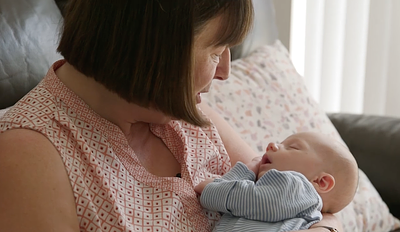Looking for all Articles by Early Years team?
Sleep baby sleep: the power of lullabies
Discover the many benefits that a simple lullaby can have on the emotional wellbeing of babies and young children.

People from every culture of the world have used melodic, rhythmic songs to soothe their young, especially when sleep comes calling. But why are lullabies so special?
Repetition encourage relaxation
The repetitive nature of lullabies encourages babies to relax. Most have a simple structure and tune that is repeated over and over, making it easy for little ones to get to grips with. It's also helpful for the person singing as they don't need to remember lots of complex words and verses! The repetition of the melody and words can be very soothing, as babies feel comforted when they hear familiar sounds. Singing a song that they remember hearing from inside the womb can add another layer of reassurance.
Slow rhythms encourage gentle rocking
Lullabies are often sung to a slow beat or rhythm that mirrors a gentle rocking motion. Watch Karen sing Sleep Baby Sleep(this link will open in a new window) on the Bookbug app or Bookbug Song and Rhyme Library and notice how she sways Bookbug in her arms to the beat. Lullabies often have a strong, steady beat which can be very similar to a mother’s heartbeat, the first sound a baby hears. This increases the calming effect on a baby or young child, particularly at the end of a busy day.
Closeness and connection reduce stress
Unlike songs which encourage little ones to move around, lullabies are typically shared with babies in the arms of a loved one. This closeness adds to a baby's feeling of safety and supports the emotional bonds between them and their mums, dads, or carers. Oxytocin – a hormone which supports bonding and helps reduce stress – is produced in response to physical touch, so gently stroking or patting your wee one while you’re singing is an important way to help them feel that they are loved. And let's not forget the eye contact. Looking down at a baby's face as you gently sing lets your baby know that you are connected to them. These shared moments of closeness have a hugely positive impact on both you and your baby's stress levels.
Physical, mental and emotional benefits for all ages
The words we sing in more modern lullabies often focus on the arrival of sleep, or our love for our children. This helps to reinforce positive emotions and encourage good sleep routines at bedtime. Although we associate lullabies with very young babies, toddlers and older children can still enjoy them too, particularly when they feel out of sorts or unsettled. A fascinating research study(this link will open in a new window) with Great Ormond Street Hospital and the University of Roehampton discovered that child patients at the hospital experienced 'lower heart rates, less anxiety and reduced perception of pain' after they had lullabies sung to them. Proof that these songs can help little ones feel better physically, mentally and emotionally.